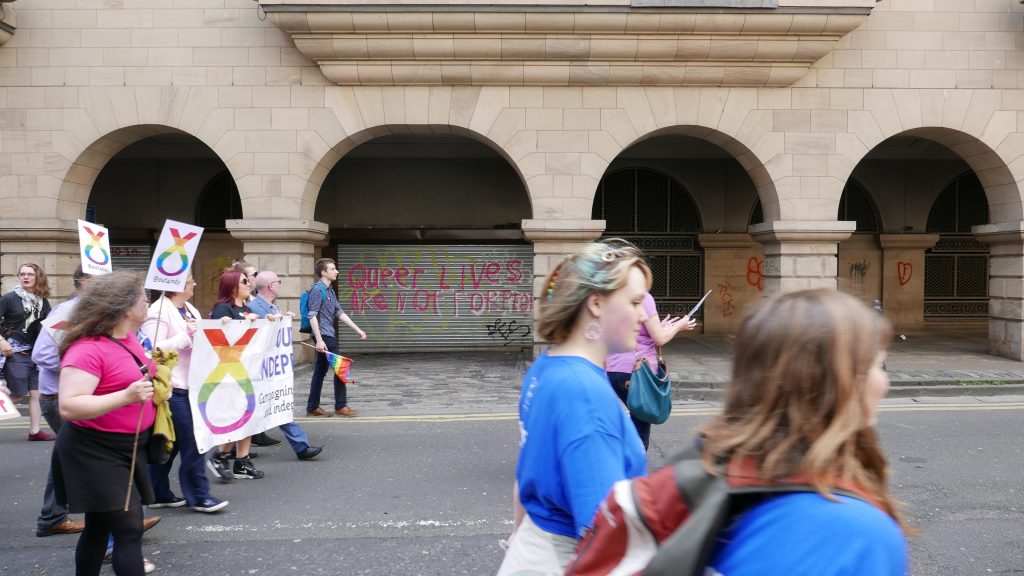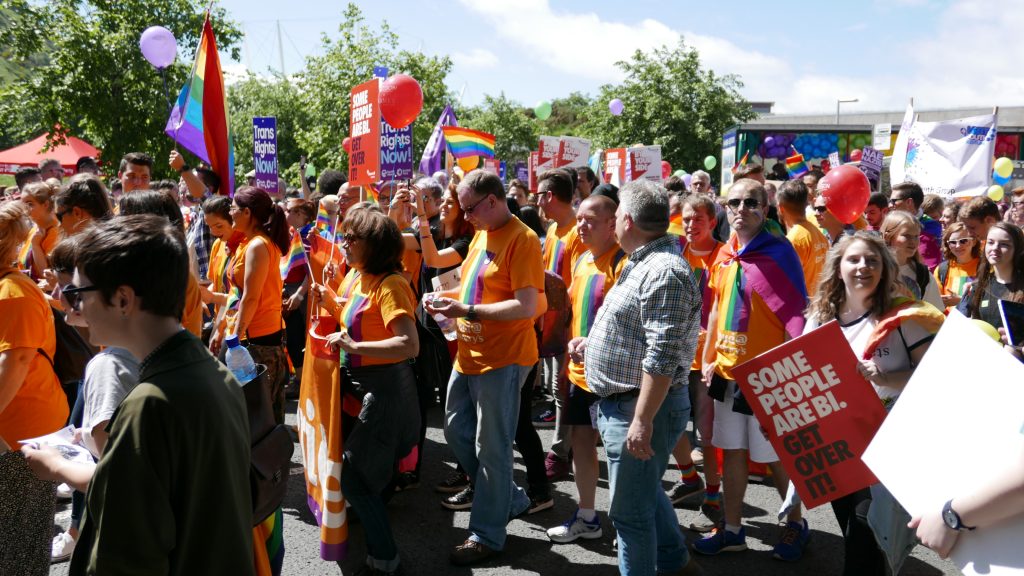Beware the Hand that Feeds
 Beware the Hand That Feeds You: Corporate Participation in Social Justice Movements.
Beware the Hand That Feeds You: Corporate Participation in Social Justice Movements.
At the recent Pride march in Edinburgh there was a counter march against corporate participation in the Pride movement. Protesters spray painted ‘Pride over Profit’ on walls along the route, hung banners, and chanted at the marchers in an effort to restore a sense of political activism to a social justice movement they feel is at risk of stagnation.
They raise an important point. Corporations generally do not risk controversy, nor do they argue for social change. They do lobby for favourable business conditions though, and they are not going to criticise the government on Monday and ask for favours on Tuesday. By letting this go unchallenged we allow these companies to distract us from the real issues, and we allow them to pretend PR is corporate social responsibility. Not only that, but letting these institutions fund and therefore shape events like Pride necessarily blunts activism because provocative acts alienate financial backers seeking to avoid negative publicity.
Unfortunately these financial backers are crucial, and alternative sources may be worse. In a movement about inclusion it is absurd that Manchester Pride charges £18 for participation, and up to £150 for a ‘Platinum package’. This is Pride as entertainment not for challenging political attitudes to equal marriage in Northern Ireland. Pride is not free to organise, and Edinburgh’s unticketed event still needed road closures and police presence, neither of which are cheap. This money cannot come from those marching because it prevents participation from those on low or no incomes, especially young LGBT people who are arguably the most important targets for a Pride movement as they seek to find their place in society.
It’s not that a depoliticised Pride achieves nothing. If you’re a young LGBT person in Edinburgh it must mean a lot to see that not only are you not alone, but that you’re accepted (and can get your chicken from Nando’s). Seeing the police holding the rainbow flags given to them by marchers, or signing a young girl’s t-shirt must make the world feel a safer place.
 So what do we want from this deal with the corporate devil? Do we want anonymous donation? Maybe not. After all, there is definitely a benefit to employees of these companies to be so openly acknowledged and supported, and they may in fact be the ones driving corporate engagement. We definitely can’t expect corporations to refuse to sponsor if asked; Nando’s do not want to be Scotland’s Chick-fil-A.
So what do we want from this deal with the corporate devil? Do we want anonymous donation? Maybe not. After all, there is definitely a benefit to employees of these companies to be so openly acknowledged and supported, and they may in fact be the ones driving corporate engagement. We definitely can’t expect corporations to refuse to sponsor if asked; Nando’s do not want to be Scotland’s Chick-fil-A.
The solution may be to stop trying to make Pride political at all. With marches across the UK taking place over several months you could easily stage a carnival for Pride, and then campaign separately without compromise, megaphone in hand, on what needs to happen next and not how far we’ve come. If corporations want to support it I would be more than happy to see that Nando’s chicken waving a placard of Arlene Foster drawn with a Hitler moustache.
The ramifications of corporate rainbow-washing extend beyond the Pride movement, and can obscure a multitude of sins. For example, you may think that if Nando’s are pro-LGBT (and I am picking on Nando’s here because they annoyed me the most on the day) then they must be generally conscientious. However, they boast that their chickens only come from farms meeting the Red Tractor standard, which is the absolute lowest possible certification for animal welfare. As a business that sells chicken, is their lamentable attitude to their supply chain mitigated in any way by their stance on LGBT rights? I would argue not, and this positive PR from Pride participation only serves to distract us from the questions we should really be asking about the ethics of chicken restaurants.
Similarly, Bank of Scotland may well celebrate LGBT causes, but should that influence our perception of them at all when they are part of Lloyds Banking Group who currently invest in companies manufacturing nuclear weapons? It isn’t only LGBT rights. BP have been long been famous for their greenwashing to make you feel less guilty buying their petrol. Clothing retailers are co-opting the language of feminism to empower women to buy clothes made in terrible working conditions, when textiles are the second most polluting industry in the world. Corporations pick the easy stances and use them as fig leaves to mask activities they would rather keep out of the news.
Some will say that in the context of accepting sponsorship of Pride the ends justify the means; that corporate sincerity does not matter if it furthers the cause. Some will say that it is better for companies to do even a little good, rather than no good at all. I say that we should leverage these ethics-as-PR activities to demand equivalent practice in all their corporate activities. They can’t walk away from Pride now, and LGBT equality in a sweatshop retailer is not to be celebrated.
When the principal opposition to Pride is coming from the LGBT community is time to ask some questions about Pride as a vehicle for activism. As we marched along the Cowgate an optimistic cry of ‘What do we want?!’ drew only embarrassed silence, then nervous laughter. Getting the PR out of popular social movements isn’t going to happen until those movements are demanding change, and if Pride won’t then it’s time to find one that will.

Couldn’t agree more but corporations also pay for pride of place at party conferences. And they expect the same sorts of returns too.
There are plenty of big charities that could provide sponsorship much as wateraid and greenpeace do at Glastonbury.
We need to stop choosing our friends based on how respectable they make us look.
Marches aren’t the same as party conferences.
Aren’t they?
What lesson is Ben Simmons asking us to learn when he says…..
“Corporations generally do not risk controversy, nor do they argue for social change. They do lobby for favourable business conditions though, and they are not going to criticise the government on Monday and ask for favours on Tuesday. By letting this go unchallenged we allow these companies to distract us from the real issues, and we allow them to pretend PR is corporate social responsibility. Not only that, but letting these institutions fund and therefore shape events like Pride necessarily blunts activism because provocative acts alienate financial backers seeking to avoid negative publicity.”
I don’t think he’s saying that only campaigners for LGBT rights needs to worry about activism being blunted.